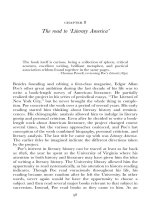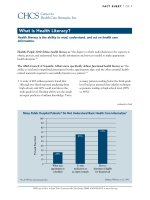The road to war france and vietnam, 1944–1947
Bạn đang xem bản rút gọn của tài liệu. Xem và tải ngay bản đầy đủ của tài liệu tại đây (3.04 MB, 321 trang )
Tai Lieu Chat Luong
0 Prelims
11/15/02
5:39 PM
Page i
THE ROAD TO WAR
0 Prelims
11/15/02
5:39 PM
Page ii
Contemporary France
General Editor: Jolyon Howorth, University of Bath
Volume 1
Humanity’s Soldier: France and International Security, 1919–2001
David Chuter
Volume 2
The Road to War: France and Vietnam, 1944–1947
Martin Shipway
Volume 3
France at War in the Twentieth Century: Propaganda, Myth and
Metaphor
Edited by Valerie Holman and Deborah Kelly
Volume 4
Recollections of France: The Past, Heritage and Memories
Edited by Sarah Blowen, Marion Demossier and Jeanine Picard
Volume 5
Party, Society and Government: Republican Democracy in France
David Hanley
Volume 6
The Shaping of Environmental Policy in France
Joseph Szarka
0 Prelims
11/15/02
5:39 PM
Page iii
THE ROAD TO WAR
France and Vietnam, 1944–1947
;
Martin Shipway
Berghahn Books
New York . Oxford
0 Prelims
11/15/02
5:39 PM
Page iv
First published in 1996
Second printing 1999
Paperback edition in 2003
by
Berghahn Books
www.berghahnbooks.com
© 1996,1999, 2003 Martin Shipway
All rights reserved.
No part of this publication may be reproduced
in any form or by any means without the
written permission of Berghahn Books.
Library of Congress Cataloging-in-Publication Data
Shipway, Martin.
The road to war : France and Vietnam, 1944–1947 / by Martin
Shipway.
p. cm. -- (Contemporary France)
Includes bibliographical references and index.
ISBN 1-57181-894-4 (alk. paper)
1. Indochina--History--1945– 2. France--Colonies. I. Title.
II. Series.
DS550.S54 1996
959.7'03--dc20
96-24310
CIP
British Library Cataloguing in Publication Data
A CIP catalogue record for this book is available from
the British Library.
Printed in the United States on acid-free paper
0 Prelims
11/15/02
5:39 PM
Page v
For my mother and father
0 Prelims
11/15/02
5:39 PM
Page vi
0 Prelims
11/15/02
5:39 PM
Page vii
CONTENTS
;
Acknowledgements
ix
Note on Text
Abbreviations
xi
Map of Indochina, 1945
Introduction
Part I
xiii
1
The External and Domestic Parameters of
Colonial Policy Making
1. The Brazzaville Conference and Its Origins,
1940–1944: Policy Formulation and Myth Making
on the Congo
11
2. The Republic Strikes Back, 1944–1945:
Brazzaville Policy and the Metropolitan Critique
41
3. ‘We Are in the Midst of Colonial Crisis’:
The Response to International and Colonial Change
64
4. The Domestic Parameters of Colonial Policy Making
After the Liberation, 1944–1946
84
Part II Policy Making in Indochina and Its
Breakdown, 1945–1947
5. Calculating the Stakes: Brazzaville Policy and
the ‘Return’ to Indochina, December 1943–
September 1945
115
0 Prelims
11/15/02
viii
|
5:39 PM
Page viii
Contents
6. The Primacy of Action: From the ‘Return’ to Saigon,
October 1945, to the Signing of the Accords of
6 March 1946
150
7. Who Rules: Paris or Saigon? The Dalat Conference
and the Cochinchina Policy, March–June 1946
177
8. ‘A Round of the Battle We Are Fighting’:
The Fontainebleau Conference, June–September 1946
200
9. The Narrowing of French Policy Options,
Autumn 1946: The Accords Policy Abandoned?
222
10. ‘The Tonkin Vespers’, December 1946:
Burying the Accords Policy
248
Conclusion
273
Appendix I: The Administrative Structure of the
French Empire, 1945
280
Appendix II: Chronology of Events in France and
Indochina, 1944–1947
282
Bibliography
287
Index
296
0 Prelims
11/15/02
5:39 PM
Page ix
ACKNOWLEDGEMENTS
;
S
ince I began the research which has found its way into this
book, I have accumulated many debts, and been at the receiving end of much kindness and hospitality. I hope that over time I
may be able to repay at least a fair proportion of these debts; my
benefactors may be assured that I am a grateful debtor.
My most particular thanks go to my two successive doctoral
supervisors, John Darwin and Vincent Wright, both of Nuffield
College. Their advice, interest, and support kept me going throughout the somewhat prolonged gestation of my doctoral thesis, and
I am grateful for their continuing encouragement. My work has
benefited enormously from their wisdom and expertise, though I
have no doubt I could have learnt far more from their example. I
am also grateful to my examiners, Professor Douglas Johnson and,
especially, David Goldey, for their sympathetic treatment of the
work which lies behind the present volume. I have greatly appreciated the interest shown in my work, in the shape of invitations to
give papers, by Robert Holland, Institute of Commonwealth Studies, London; Ralph Smith, School of Oriental and African Studies,
London; Marc Michel, Institut d’Histoire Comparée de Civilisations, Aix-en-Provence; and Tony Chafer, Amanda Sackur, et al.,
University of Portsmouth. I have received much help from the
staff of libraries and archives in Oxford, Paris, London, and Bath;
but I am especially grateful to the staff of the Centre des Archives
d’Outre-Mer in Aix-en-Provence, who have contributed to a number of highly productive and enjoyable research trips.
Many friends have helped and supported me with this project.
I must particularly mention Stein Tønnesson, a far more serious
scholar of Vietnam than I could aspire to be, to whom I owe my
initial interest in Indochina. He most generously shared with me
some of his finds from the nether reaches of the archives; my debt
0 Prelims
11/15/02
5:39 PM
Page x
x | Acknowledgements
here was compounded by the fact that I was subsequently unable
to gain access to those same archives (see Bibliography). For memories of a now-distant summer in Aix I have to thank Stein and
many others, not least the irrepressibly hospitable Olivier Vergniot. Amongst my friends in Oxford, it was perhaps Simon Auerbach who was most supportive to me in this project, not least by
demonstrating in person how to finish a doctorate. My love of
France, and interest in all things French, I owe in the first instance
to my oldest French friend, Jean Le Noac’h.
The present work was largely produced while I was a Lecturer
in the School of Modern Languages and International Studies, University of Bath. From my erstwhile colleague and present friend
Claire Duchen (now translated to Sussex) I gratefully acquired
many of the tools of my trade, and to Bill Brooks I owe many
things, not least a probably quite healthy taste for the ironies of
University life. I would also like to acknowledge the support and
encouragement of Professor Jolyon Howorth in backing my
research, and to thank him as Series Editor for his guidance. Of
course, neither he nor anyone but myself bears any responsibility
for the deficiencies of what follows.
Finally, the person whose love, patience, and enthusiasm have
made this work possible, and even enjoyable, is Mary Anne Ansell.
To her, Victoria, and Jenna, for their moral support, good humour,
and friendly disparagement, I offer my special thanks.
Birkbeck College
University of London
Martin Shipway
1996
0 Prelims
11/15/02
5:39 PM
Page xi
NOTE ON TEXT
;
F
or the sake of the English reader, all French sources have been
translated by the author. However, it was felt that the spirit of
the French sources was often of sufficient interest to warrant inclusion of the original, which is therefore reproduced in the Notes.
No attempt is made to reproduce diacritics in Vietnamese names.
French and Vietnamese abbreviations are used throughout, rather
than an artificial and often misleading translation. In what follows
a ‘straight’ translation of abbreviated names is provided; the
reader is referred to the term’s first appearance in the text for further clarification.
Abbreviations
AEF
AOF
CEFEO
CFLN
CNF
CNR
Cominindo
DAE
DAP
DGER
DIC
DOM
Afrique Equatoriale Franỗaise (French Equatorial Africa)
Afrique Occidentale Franỗaise (French West Africa)
Corps Expộditionnaire Franỗais en Extrờme-Orient (French Far East
Expeditionary Corps)
Comitộ Franỗais de la Libộration Nationale (French Committee of
National Liberation)
Comitộ National Franỗais (French National Committee)
Conseil National de la Rộsistance (National Council of
the Resistance)
Comité Interministériel de l’Indochine (Interministerial Committee
on Indochina)
Direction des Affaires Economiques (Economic Affairs Division)
Direction des Affaires Politiques (Political Affairs Division)
Direction Générale des Etudes et Recherches (General Directorate
for Studies and Research)
Division de l’Infanterie Coloniale (Division of Colonial Infantry)
Département d’Outre-Mer (Overseas Department)
0 Prelims
11/15/02
5:39 PM
Page xii
xii | Abbreviations
Dong Minh Hoi Viet Nam Cach Menh Dong Minh Hoi (League of Revolutionary Vietnamese Parties)
EMGDN
Etat-Major Général de la Défense Nationale (General Staff for
National Defence)
ENFOM
Ecole Nationale de la France dOutre-Mer (National Academy
for Overseas France)
FFI
Forces Franỗaises de l’Intérieur (French Forces of the Inferior)
FIDES
Fonds d’Investissement pour le Développement Economique
et Social (Investment Fund for Social and Economic
Development)
FOM
Ministère de la France dOutre-Mer (Ministry for
Overseas France)
FTP
Francs-tireurs et Partisans Franỗais (French Irregulars
and Partisans)
GEC
Groupe d’Etudes Communistes (Group of Communist Studies)
GPRF
Gouvernement Provisoire de la Rộpublique Franỗaise (Provisional Government of the French Republic)
Haussaire
Haut-Commissaire (High Commissioner)
MDRM
Mouvement Démocratique pour la Rénovation Malgache
(Democratic Movement of Malagasy Renewal)
MRP
Mouvement Républicain Populaire (Peoples Republican
Movement)
OSS
Office of Strategic Services
PCF
Parti Communiste Franỗais (French Communist Party)
PCI
Parti Communiste Indochinois (Indochinese Communist Party)
PRL
Parti Républicain de la Liberté (Republican Freedom Party)
SFIO
Section Franỗaise de lInternationale Ouvriốre (French Section
of the Workers’ International)
UDSR
Union Démocratique et Sociale de la Résistance (Social and
Democratic Union of the Resistance)
Viet Minh
Viet Nam Doc Lap Dong Minh Hoi (League for the Independence of Vietnam)
VNQDD
Viet Nam Quoc Dan Dang (Vietnamese National Party)
NB. For abbreviations used in citations of archival sources, see Bibliography.
0 Prelims
11/15/02
5:39 PM
Page xiii
Indochina, 1945
0 Prelims
11/15/02
5:39 PM
Page xiv
00 Intro
11/15/02
5:49 PM
Page 1
INTRODUCTION
;
F
rance’s experience of decolonisation has generally been studied from published sources in terms of the ‘wars, plots and
scandals’ dominating French post-war history up to Algerian
independence in 1962. However, with the gradual opening of the
archives, it is becoming possible to investigate the process from
the inside, from the perspective of the policy-making elites. Based
on archival sources in France (diplomatic and colonial archives,
published official papers and memoirs, private papers), this is a
study of the role and intentions of policy makers in the French
higher administration, and especially in the Ministry of Colonies,1
during the crucial period of Provisional Government in Paris
(1944–1947). The focus is on the crucial case of Indochina, where
the French ‘return’ following the defeat of Japan led within little
more than a year to full-scale war between the French colonial
regime and Ho Chi Minh’s Democratic Republic of Vietnam. This
marked the start of seventeen years of colonial war for France, the
climax of which caused the downfall of the Fourth Republic in
1958. In Indochina it opened the first round of a thirty-year war of
liberation from foreign domination and civil war.
Indochina was the richest and most populous of France’s colonial possessions; it was also by force of historical circumstance the
most pressing issue facing colonial policy makers at the close of
the Second World War. For both these reasons, it was seen by officials in Paris as a test-case, and in many ways even as a model, for
determining not only the constitutional, political and administrative shape of the French colonial empire, renamed the French
Union (Union Franỗaise), but also the nature of France’s relations
with the emerging forces of colonial nationalism. For Indochina
1. Renamed the Ministry for Overseas France (Ministère de la France d’OutreMer) when Marius Moutet became Minister in January 1946.
00 Intro
11/15/02
5:49 PM
Page 2
2 | The Road to War
exemplified most clearly in this period the dilemma facing the
colonial administration. On the one hand, a new generation of liberal colonial officials identified the French Union as the means of
French restoration to the first rank of Great Powers following the
humiliations of the Second World War. This concern was particularly keenly felt given the fact that many of these officials were
early supporters of General de Gaulle (gaullistes de la première
heure) in those colonies of French Equatorial Africa and elsewhere
which ‘rallied’ to de Gaulle in 1940. But on the other hand, France’s
hold over her colonies was at its weakest, while at the same time
the aspirations of the colonial peoples were being given increasingly clear and forceful expression by nationalist movements drawing confidence from the same tide of events which had eroded
French power. Thus the new policy presented first at the Brazzaville Conference in January–February 1944, and hence known
informally as the Brazzaville policy (politique de Brazzaville), was in
essence an attempt to balance the terms of an equation of imperial
interests or, put another way, to solve a conundrum: how to meet
nationalist demands while preserving, and indeed reinforcing,
imperial unity. The basis for this new policy was the idea of a Federation, or Union, binding the metropole and colonies.
Given the apparent wealth of good intentions invested in this
new policy, how did the French colonial administration become
engaged so precipitately in one of its most disastrous policy-making failures? The argument of historical hindsight, that imperial
federalism was a clumsy attempt to square a circle and to reconcile
the conflicting and inherently incompatible ends of imperialism
and national self-determination, appears to be only partially adequate. This study sets out to explore more fully the reasons for the
rapidity with which France’s liberal policy collapsed, and for the
apparent readiness with which French officials acquiesced in that
collapse. These reasons are sought in an analysis of the political
and administrative mechanisms and the ideological underpinnings of policy making in a period of political turbulence and
uncertainty following the Liberation of France.
Starting from a critical examination of the Brazzaville policy as
defined by its principal proponent, Henri Laurentie, Director of
Political Affairs at the Ministry of Colonies, the study shows how
the new policy evolved in response to official perceptions of a
‘colonial crisis’, manifested not only in Indochina, but also in the
crises in Eastern Algeria and in Syria which erupted, as if on cue,
at the moment of Victory in Europe. Liberal French officials showed
00 Intro
11/15/02
5:49 PM
Page 3
Introduction | 3
unprecedented concern for this ‘colonial’ side of the equation and,
in particular, an enlightened understanding of the need to make
concessions to local nationalists. Even so, even a genuinely liberal
imperial policy needed to be couched in terms appealing to metropolitan French values. This had the unintended consequence of
reinforcing the longstanding myths surrounding the French colonial mission. Indeed, arising out of Gaullism’s ‘heroic period’,
Brazzaville suggested new elaborations of the colonial myth, which
were open to interpretation by a variety of actors bringing to bear
conflicting ideological concerns and political interests. Over time,
the liberal vision of colonial policy makers was contaminated, distorted, and ultimately defeated by French actors pursuing aims
which, while distinct from those originally defined by Laurentie
and his colleagues, could nonetheless be presented in terms of the
Brazzaville policy.
This process of contamination or distortion affected colonial
policy making in two principle ways in the specific case of Indochina. First, domestic political factors impinged on the colonial
policy-making process. It is suggested that the new policy was
drawn up on the basis of an implied model of domestic politics.
Working at first within the political vacuum of de Gaulle’s improvisatory ‘Resistance State’ at Algiers,2 policy makers assumed that
politics after the Liberation would operate consistently according
to a given set of political parameters; this would allow the administration to focus on external factors, taking for granted domestic
factors such as the salience of colonial policy on the domestic
political agenda, its acceptability within a given ideological framework, or the continuing solidarity of the institutions on which policy depended. In fact, in common with much of the planning that
came out of the Resistance, this initial model was faulty, or at best
over-optimistic, and failed to take into account the domestic political crisis which prevailed throughout the period of Provisional
Government.3 As a result, there were continual shifts in the domestic parameters governing the policy-making process. Indeed, the
hostile or uncomprehending response to the new policy at Brazzaville and during the internal debate which followed suggested
already the potential mismatch between the Brazzaville policy
and metropolitan, especially Republican, perceptions of empire.
2. ‘Etat Résistant’, J.-B. Duroselle, Politique étrangère de la France, L’âbime, 1939–
1945, Paris, 1982, 473.
3. On the planning of the Resistance, see A. Shennan, Rethinking France, Plans for
Renewal, 1940–1946, Oxford, 1989.
00 Intro
11/15/02
5:49 PM
Page 4
4 | The Road to War
In this way, policy was adapted to reflect, in particular, the shifting
importance or significance of ideologies or ideological trends having a bearing on colonial policy, such as Gaullism, Republicanism,
anti-Communism or old-fashioned imperialism. Such a process
might at times be conceived as a way of ‘selling’ the policy, while
at others it simply mirrored the extremely rapid evolution of French
politics at this period. As the ideological cast of mind of the policy
makers altered, so, too, the aims of policy shifted, often quite subtly, so that by late 1946 the colonial administration had apparently
lost sight of its original objectives as set down in 1944–45.
The second form of unintended mutation which the Brazzaville
policy underwent was the result of more direct and wilful interference. This was the deformation of policy proposals wrought by
actors working within the hierarchy of the colonial administration,
but who chose to misinterpret, overlook or simply to disobey
orders issuing from Paris. The administrative ethos of the French
colonial service had long condoned or encouraged independent
initiative. Nonetheless, the cumulative effect of acute political
instability in Paris, administrative ambiguities concerning the chain
of command, and the sheer scale of the problem faced by the colonial administration in Indochina, fostered hitherto unthinkable acts
of insubordination by administrators and soldiers working far
from Paris. Differences of political, functional or geographical perspective are also highlighted: even allowing for the intrusion of
personal agendas and interests, an event or policy was open to
quite different interpretation, according to whether it was viewed
from Paris, Saigon or, say, de Gaulle’s country retreat at Colombeyles-Deux-Eglises; from a ministerial private office or from the corridors of the Rue Oudinot (the quarters of the Ministry of Colonies,
opposite the Invalides in Paris); from the High Commissioner’s
Palace in Saigon or French headquarters in Hanoi. As will be
shown, these differences of perspective and interpretation would
lead, in the case of Indochina, to the emergence of rivalry between
two distinct centres of decision making, in Paris and Saigon. Indeed,
the outbreak of war in Indochina marked the temporary resolution
of this rivalry in favour of Saigon.
This account of policy making concurs with the findings of
other recent research in attributing to the Saigon administration
a large part of the blame for the turn of events which led to war.
But it goes further, for it argues that the two forms of policy mutation go together. This was for two reasons. First, administrative
insubordination was arguably more brazen and effective as a result
00 Intro
11/15/02
5:49 PM
Page 5
Introduction | 5
of domestic political uncertainties. Secondly, Saigon’s independent
course of action itself fed back into the system, so that ex post facto
rationalisations were often found for events which had come about
directly as a result of breaks in the chain of command. This in turn
may help to explain one surprising aspect of the breakdown of
policy in Indochina, which is the extent to which it was downplayed or, more usually, simply accepted within the political and
administrative establishment, albeit with responses ranging from
regret and resignation, at one end of the scale, to relief and enthusiasm at the other. Indeed, by the time of the start of the war, even
a beleaguered coalition government was more than equal to the
task of explaining away, to a bored and increasingly disillusioned
electorate with little interest in colonial affairs, an event eight
thousand miles away which could variously be interpreted as an
unpleasant but necessary task for the Republican ‘civilising mission’ (la mission civilisatrice), the defence of the Motherland (la
mère-patrie), the defeat of colonial rebels, or simply as a Red Scare
in the early rounds of France’s domestic Cold War. In this way the
early guardians of the Constitution of the Fourth Republic were to
be seen storing up trouble which would ultimately lead to the
crumbling of that Constitution.
The period covered by the study is brief, but few would dispute
that the tumultuous life-cycle of the Provisional Government
(Gouvernement Provisoire de la République Franỗaise, GPRF) was
extremely important in the evolution of the French state, or that
the period was remarkably self-contained. It will be observed that
colonial policy making described the same downward trajectory
as the greater whole of which it formed an increasingly significant
part. At the Liberation of Paris, in August 1944, officials at the
Ministry of Colonies could be forgiven for thinking, however
naïvely or erroneously, that most things were possible. By the time
of the outbreak of war in Indochina, the die was cast: France had
a Constitution, albeit imperfect and only grudgingly accepted by
the voters in the November 1946 referendum; in May 1947, the
course of France’s domestic Cold War was to be decided by the
expulsion of Communist ministers from the Ramadier government; and a semblance of inevitability attaches also to the fate of
France’s colonial mission, which was dealt a further heavy blow in
March 1947 by the insurrection in Madagascar.
The study builds on work accomplished recently by historians
of French decolonisation and of Indochina, much of it based on a
detailed understanding of the available archival sources. The
00 Intro
11/15/02
5:49 PM
Page 6
6 | The Road to War
extent of scholarly attention which at long last is being paid to
France’s decolonisation process is reflected, for example, in the
series of colloquia organised by French research institutes.4 In
respect of Indochina, the work of two historians in particular has
proved invaluable. First, Philippe Devillers, whose first history of
the war in Indochina was published even before the war ended, in
1952, has published an extensive collection of documents, with
commentary, which covers the same period as the present study.
Devillers’s work combines unique mastery of the sources with an
unparalleled understanding of the history of French involvement in
Indochina. As he himself comments: ‘The archives have confirmed
our worst suspicions’.5 Secondly, Stein Tønnesson’s intricate unravelling of the functioning and dysfunctioning of the colonial administration in Indochina on the eve of the war has served both as a
mine of information and as a model of scholarship.6 Apart from reference to published collections of documents, and some careful
recourse to the memoirs of some of the actors involved, the study
uses the findings of the author’s own archival research in Paris
(Henri Laurentie’s papers at the Archives Nationales, files relating to
Indochina in the Archives Diplomatiques) and Aix-en-Provence (various collections at the Centre des Archives d’Outre-Mer).7
The present work parts company from its predecessors in both
perspective and purpose. Where Devillers and Tønnesson are
both primarily concerned to elaborate an understanding of the
4. See especially Institut d’Histoire du Temps Présent (IHTP), Les chemins de la
dộcolonisation de lempire franỗais, 19361956, Paris, 1986; Institut Charles-deGaulle and IHTP, Brazzaville, Janvier–Février 1944, aux sources de la décolonisation,
Paris, 1988; G. Pedroncini and P. Duplay, eds, Leclerc et l’Indochine, 1945–1947,
quand se noua le destin d’un empire, Paris, 1992; and, more recently, Institut d’Histoire Comparée des Civilisations and Institut d’Histoire du Temps Présent, Décolonisations européennes, Aix-en-Provence, 1995, and C.-R. Ageron and M. Michel,
eds, L’ère des décolonisations, Paris, 1995 (Papers of the 1993 Colloquium ‘Décolonisations Comparées’).
5. ‘Les archives ont confirmé ce que l’on supposait de pire’, P. Devillers, ParisSaigon-Hanoi, Les archives de la guerre 1944–1947, Paris, 1988, 11; see also his Histoire
du Viêt-Nam de 1940 à 1952, Paris, 1952.
6. S. Tønnesson, 1946: Déclenchement de la guerre d’Indochine, Paris, 1987; see also
his ‘The Outbreak of the War in Indochina, 1946’, unpubl. thesis, PRIO, Oslo, 1983.
7. See especially Amiral G. Thierry d’Argenlieu, Chronique d’Indochine, 1945–
1947, Paris, 1985, comprising the diary and private papers of one of the story’s
principal actors and myth makers; J. Sainteny, Histoire d’une paix manquée, rev. ed.,
Paris, 1967; M.J. Shipway, ‘The Brazzaville Conference, 1944: Colonial and Imperial Planning in a Wartime Setting’, M. Phil. thesis, University of Oxford, 1986, and
‘France’s “crise coloniale” and the breakdown of policy making in Indochina,
1944–1947’, D. Phil. thesis, University of Oxford, 1992.
00 Intro
11/15/02
5:49 PM
Page 7
Introduction | 7
course of events in Indochina, the focus of this study is set firmly
on Paris. This reflects a belief that in matters of colonial policy,
decisions, wrong decisions, reluctant decisions and even non-decisions were all made in the metropole (or if not made there, then
covered, accepted or repudiated there), however many hands
were forced, arms twisted or even legs pulled in the process. In
this case, as will be seen, the Political Affairs Division (Direction des
Affaires Politiques) offers a curiously privileged, and yet by the
same token detached, perspective on events, some way down the
hierarchy between the Government at its pinnacle and the colonial
officers at its base. As Laurentie’s brief career in the higher administration also illustrates, however, detachment has its frustrations
– and its dangers, particularly when the summit of the pyramid is
whipped by storms, and its base threatened by subsidence.
Secondly, although Indochina is taken as a case for detailed
study, its purpose is more general, that is, to broaden our understanding of the process of decolonisation, and of French decolonisation in particular. The adoption of the metropolitan perspective
calls for two caveats. First, understanding the point of view of the
metropole requires a readiness to accept the premises of the
period, but this need not imply any kind of revisionism. As Alfred
Grosser warns us, ‘Analysing the origin of colonial conflicts after
1944 means understanding first of all that, at the time, France’s
civilising mission was not simply a formula in which people hypocritically pretended to believe; these days, on the contrary, colonisation is viewed through a distorting prism which makes it seem
as if it was nothing but brutality and exploitation’.8 Secondly, the
ending of colonial empires was clearly an event of global significance, and no doubt with global causes, but whose effects in this
instance are to be studied within a largely domestic French, Western European, context. Decolonisation was one of two phenomena,
along with the Cold War, to have dominated the politics of some
West European states such as Britain and France, while largely
determining the post-war framework of international relations. As
Grosser also reminds us, France’s experience of these two phenomena was uniquely concentrated: ‘From 1947, the Fourth
Republic lived through the drama of being the only European
8. ‘Analyser la naissance des conflits coloniaux après 1944, c’est d’abord comprendre que la mission civilisatrice de la France n’était pas à l’époque une simple
formule à laquelle on jouait hypocritiquement à croire, alors qu’aujourd’hui le
prisme déformant fait trop souvent admettre que la colonisation aurait été exclusivement brutalité et exploitation.’ A. Grosser, Affaires Extérieures, Paris, 1984, 12.
00 Intro
11/15/02
5:49 PM
Page 8
8 | The Road to War
country to experience simultaneously on a domestic front both of
the great conflicts which tore the post-war world apart: the antagonism between East and West, and decolonisation’.9 Understanding
decolonisation, as far as possible from the inside, is thus a vital key
to understanding France’s and Western Europe’s post-war history.
The study is divided into two parts. Part One is concerned with
the origins and formulation of the Brazzaville policy, and with the
problematic relationship of domestic politics and colonial policy
making at this period. Chapter One reassesses the Brazzaville Conference, suggesting that a multivalent Brazzaville myth was from the
outset inseparable from the intended reality of the Brazzaville policy.
Chapter Two examines Henri Laurentie’s proposals for the Brazzaville
policy, and evaluates metropolitan opposition to these proposals.
Chapter Three examines the ways in which liberal proposals for policy evolved in response to an analysis of impending colonial crisis.
Chapter Four describes the political, ideological and administrative
context for colonial policy making, and examines the policy makers’
implied model of domestic politics as relating to colonial policy.
Part Two examines French policy making in Indochina from the
preparations for a French ‘return’ at the end of the Second World
War, until the outbreak of war with the Democratic Republic of
Vietnam in December 1946. Chapter Five considers the period up to
the eve of the ‘return’ in September 1945, as officials sought to
make policy aimed at the ‘moving target’ created by the Japanese
takeover in Indochina, the shockingly swift ending of the War in
Asia, and the August 1945 Revolution in Hanoi. Chapter Six examines the disagreements and ambiguities underlying the negotiating process which led to the Accords of 6th March 1946. Chapter
Seven charts the development of rivalry between Paris and Saigon
following the signing of the Accords. Chapter Eight covers the
unavailing efforts of the government and administration in Paris
to regain the initiative during the Fontainebleau Conference, over
the Summer 1946. Chapters Nine and Ten trace the disintegration of
policy against the gathering gloom of worsening Franco-Vietnamese relations, and despondency and chaos in France, leading
to the start of France’s futile and bloody war with the Vietnamese.
9. ‘La IVe République a connu dès 1947 le drame d’être le seul pays européen à
vivre simultanément comme conflits internes les deux grands déchirements du
monde d’après-guerre: l’antagonisme Est/Ouest et la décolonisation.’ Ibid., 9–10.
01
11/15/02
5:50 PM
Page 9
PART I
THE EXTERNAL AND DOMESTIC PARAMETERS
OF COLONIAL POLICY MAKING
01
11/15/02
5:50 PM
Page 10









